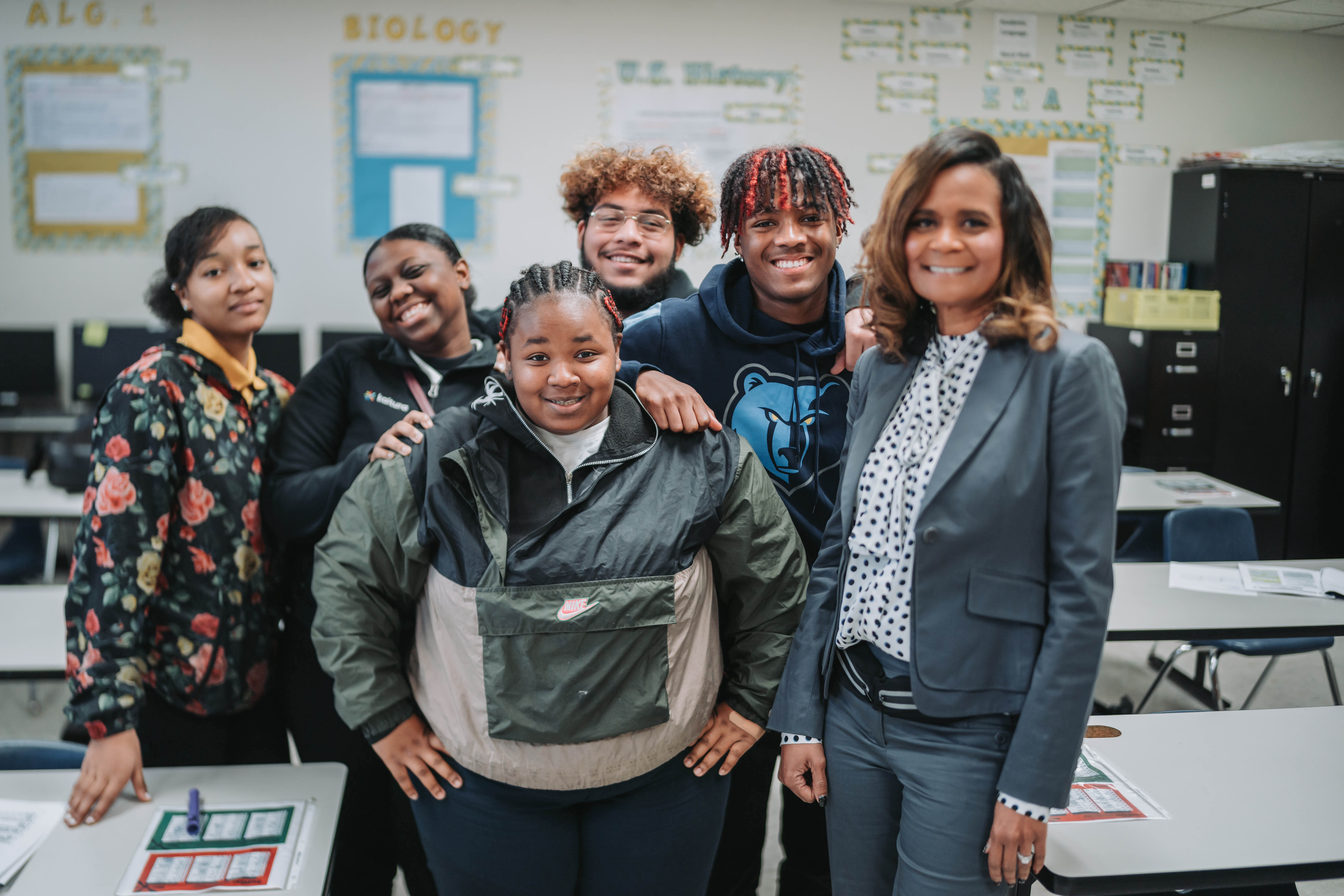MSCS Scribes is education news from the education experts: our faculty! We’re excited to share our first article from one of our MSCS Scribes, teacher Jeffrey Monroe.
For many students, school is the first place where their unique gifts are seen, heard, and affirmed. Teachers dedicated to the whole child philosophy strive to show that each student in their care has a unique gift that can serve as a foundation for student success in school and beyond. However, discovering those gifts is work that often stretches beyond the curriculum. So how do educators find and leverage students’ hidden talents?
 (Left Photo) Chemistry Teacher Jeffrey Monroe with Student (Right Photo) English Teacher Shonkilah Monroe with Student
(Left Photo) Chemistry Teacher Jeffrey Monroe with Student (Right Photo) English Teacher Shonkilah Monroe with StudentEducators must deeply believe in their ability to help students achieve their goals despite difficult odds. When embraced schoolwide this concept is called collective teacher efficacy. Across Memphis-Shelby County Schools (MSCS), teachers are demonstrating efficacy through instructional strategies and activities that help students unlock portals of yet discovered talents.
Amber Speight-Cole is a math teacher at Hollis F. Price Middle College. She discovers students’ talents by beginning the school year with a series of personal assessments. Students have an opportunity to explore their best approaches to learning and studying through a learning style inventory. She also gives students Gretchen Rubin's “The Four Tendencies” quiz. This assessment helps students understand how they react to various situations, and how those reactions influence and develop their habits.
 Hollis F. Price Middle College High Students
Hollis F. Price Middle College High StudentsThe culminating task is for the students to produce a creative representation of themselves and all the characteristics discovered through the exercises. The students present their display to the class.
“Not only does this assignment help students to understand themselves, it allows me as the teacher an opportunity to get to know each student on more than just an academic level,” said Speight-Cole. “In doing so, I can then tailor lessons, learning opportunities, and activities to leverage those qualities and optimize student output.”
As a teacher, observing students is a valuable tool. When students start the school year or a new semester, they are often very reserved or timid. Because of this, Shonkilah Monroe, an English teacher at Hollis F. Price, makes it a priority to learn her students' likes, dislikes, and quirky habits. She also initiates a community building activity called “Hot Seat.” With “Hot Seat,” the teacher places chairs in a circular position and only one chair is put in the center of the circle.
 Hollis F. Price Students with English Teacher Shonkilah Monroe
Hollis F. Price Students with English Teacher Shonkilah MonroeMonroe begins by asking one student to move to the “Hot Seat.” Then, she tells the student what phenomenal talents or positive habits she has noticed. She allows volunteers from the circle to add to her interpretation. They share more wonderful attributes. A new student is placed in the “Hot Seat,” and the cycle continues.
“This activity affirms the student’s uniqueness, and it allows them to be more open to their peers and start to build relationships or bonds with them,” she said.
“The students thoroughly enjoy playing Hot Seat and they want to know what you noticed about them, or what qualities they have. They are surprised when the teacher or peers are accurate, and they hear positive affirmations,” Monroe added.
This builds a sense of belonging because students want to be seen, heard, and understood. With so much going on in students’ lives, “Hot Seat” is an effective community-building activity to discover and leverage student’s hidden talents.
Speight-Cole and Malone are just two of the many MSCS educators creating classroom conditions that affirm, recognize, and see every child as an asset to the community. This work is especially important as schools nationwide rebuild school culture amid a stubborn pandemic. It has become evident that many students returned from remote and hybrid learning with learning deficiencies and social-emotional challenges.
The pandemic continues to be a transformative experience for students, and they are arriving to class with a different perspective. In short, students are forever changed. If students have changed, then educators must adapt and change with them.
Part of that adaptation means shifting together from a deficit mindset to an asset-based approach that builds on students’ knowledge, interests, and talents. This is the unseen work that many great MSCS teachers perform every day, and it is often the most important and most rewarding work of all.
 Jeffrey Monroe
Jeffrey Monroe
About the Author
Jeffrey Monroe is a Chemistry teacher at Hollis F. Price Middle College and husband of Shonkilah Monroe. When he’s not teaching he enjoys volunteering with organizations dedicated to improving STEM education.